mbchurches
Liked by miabliss and others
mbchurches
Modern idolatry, ancient lies
#instagram #socialmedia #unknowngod #lost
More than sixty years of sharing the life & story of the Mennonite Brethren in Canada
VOLUME 62, NO. 7
CHURCH IS A MISSION
HOLY SPIRIT—FILL US WITH YOUR GOODNESS
NEW TO THE MB CONFESSION OF FAITH: ARTICLE 1 EXPLANATORY NOTES (PART 2)
JULY 2023 MBHERALD.COM
Digest
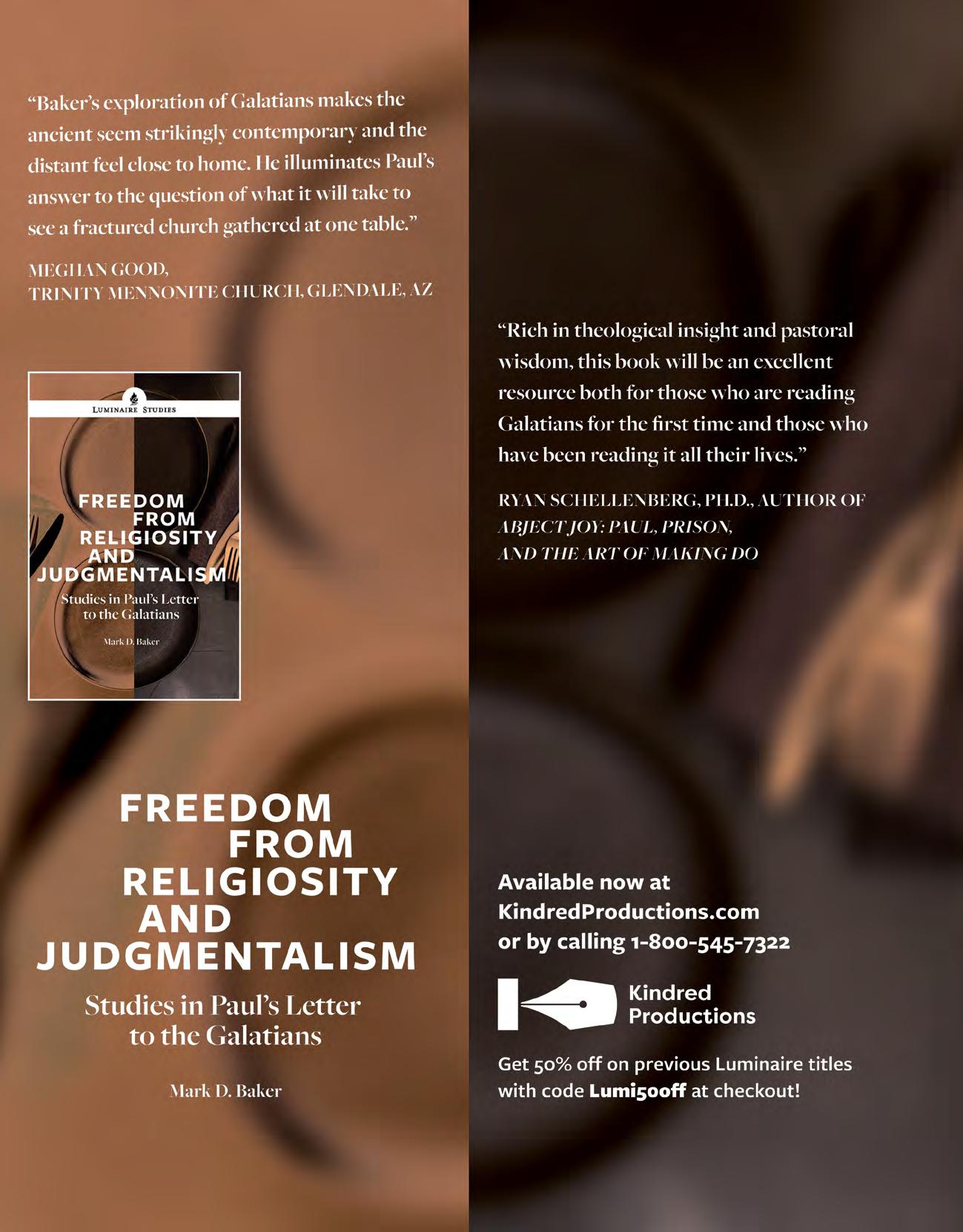
Mennonite Brethren Herald Digest is digitally published monthly by the Canadian Conference of Mennonite Brethren Churches, primarily for the use of its members, to build a Canadian MB community of faith. We seek to 1) share the life and story of the church by nurturing relationships among members and engaging in dialogue and reflection; 2) teach and equip for ministry by reflecting MB theology, values, and heritage, and by sharing the good news; 3) enable communication by serving conference ministries and informing our members about the church and the world. However, the opinions expressed here are not necessarily those of the church as a whole.
JULY, 2023 | VOLUME 62, NO. 7
EDITORIAL OFFICE
1310 Taylor Avenue
Winnipeg, Manitoba R3M 3Z6
Phone: 204-669-6575
Toll-free in Canada: 888-669-6575
MBHERALD@MBCHURCHES.CA
WWW.MBHERALD.COM
ISSN: 0025-9349
The Mennonite Brethren Herald is a publication of
6 10
CANADIAN CONFERENCE OF MENNONITE BRETHREN CHURCHES
Q&R CORNER
14
GODS OF INSTAGRAM Vic Neufeld
CHURCH IS A MISSION Fred Leonard
18
HOLY SPIRIT—FILL US WITH YOUR GOODNESS Ryan Jantzi
CONFÉRENCE CANADIENNE DES ÉGLISES DES FRÈRES MENNONITES
Participants received lanterns during Carolyn Klassen's presentation at PCO in Winnipeg, June 6-8, 2023.

Read our PCO summary on page 4.
Sharing the life and story of Mennonite Brethren in Canada
FACEBOOK.COM/MBHERALD
1 MENNONITE BRETHREN HERALD JUNE 2023
Digest
TWITTER.COM/MB_HERALD SOUNDCLOUD.COM/MBHERALD MBHERALD.COM Connect
From the editor
Carson cobbles together a couple of sentences, a mostly cohesive thought, before slipping back to his iPhone for a dopamine hit before returning to his editorial writing. “Maybe I’ll snap a quick selfie before, though, for the’ gram.” He thinks.
My attention is constantly divided. Do you ever feel that way? I bounce from task to task with a robust social media break in between. I must have accomplished so much in 2002 before the smartphone entered my life.
This past week social media giant Meta launched Threads, its Twitter killer. Within a day, 30 million people signed on to the platform. As of today, Threads has over 100 million users. For the record, I signed up this past Thursday. Add Threads to my long list of online distractions.
Why do we need these virtual environments so desperately? Why do we replace our real-world connections with digital relationships? And why do we keep going back to them even when these platforms prove to be toxic and harmful?
“What if the very nature of the smartphones’ effect on our brains— the quick access to distraction, entertainment, social engagement, and interruptions—is the very thing that robs us of a deeper, life-giving connection with Jesus?” asks Vic Neufeld. His “Gods of Instagram” sermon series asks us to consider what twenty-first-century idols have put a wedge between God and us. Vic graciously permitted MB Herald Digest to run a synopsis of that sermon series on page 14. I took my time reading and re-reading it—I recommend you consider doing so as well.
We continue our monthly prayer focus on page 18: ONMB interim director Ryan Jantzi brings us “Holy Spirit—Fill us with your goodness.” And on page 20, the National Faith and Life Team concludes our miniseries on the on the revised “Article 1: Explanatory Notes.” of the MB Confession of Faith.
I extend thanks to this month’s contributors and you, Herald reader. Sorry for cutting this month’s editorial short, but it’s been 10 minutes since I last checked my phone—I’ve got to go! If only I were joking.
With respect, Carson
CARSON SAMSON Communications director

2 MBHERALD.COM JULY 2023
Letters to the editor
Thanks, Pete, for sending in a response to our monthly prayer focus. You make some excellent points that should remind us of biblical truth.
ISN'T THE HOLY SPIRIT ALREADY HERE?
Thank you, MB Church leaders for your reminders of how Christ behaved and how we, His followers, need that same attitude to reach others. I am wondering, though, you talk a lot about asking the Holy Spirit to come. Is He not already here? We ask Him to fill us, but how can He if we are already full with all our own wishes and desires etc.? He is standing at the door and asking to come in. Let’s remember that if we draw near to Him, He can come near to us. He is waiting for full commitment!
Pete Penner
While the Holy Spirit is definitely present with each believer (if not, the person does not have the presence of Jesus with them at all), Paul still commands believers to "be filled with the Spirit." The tense of the Greek word translated here as "be filled" does not mean only once, but rather in an ongoing way. This means that while every believer possesses the Holy Spirit, not all believers are "filled" with the Holy Spirit. Barnabus is noted as exceptional in that he was "filled with the Spirit" (Acts 11:24).
Therefore, unless there is some other way to be filled with the Spirit, it seems that this is something that believers should pray for daily.
Ephesians 5:18-20:
Do not get drunk on wine, which leads to debauchery. Instead, be filled with the Spirit, speaking to one another with psalms, hymns, and songs from the Spirit. Sing and make music from your heart to the Lord, always giving thanks to God the Father for everything, in the name of our Lord Jesus Christ.
You are correct that there is little point in praying for the Holy Spirit to fill us if we do not make room for him in our lives. It would be like inviting someone to our homes and then locking the door before they enter.
Please pray for our MB churches across Canada that we might truly welcome God's Holy Spirit with full commitment to what that will look like.
Blessings and Shalom in Jesus!
Ken Esau, National Faith and Life Director
Letters to the editor
MB Herald Digest welcomes your letter on issues relevant to the Mennonite Brethren church, especially in response to material published in the magazine.
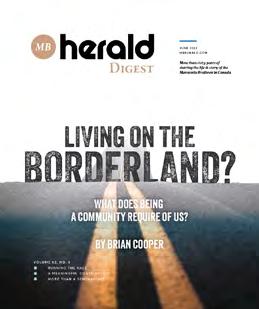
Please include name, address and phone number, and keep your letters concise, courteous, and about one subject only. We may edit letters for length and clarity. We will not publish letters sent anonymously, although we may withhold names from publication at the letter writer’s request and at our discretion. Letters may also appear online or be published in the Digest from an online source, such as comments on articles posted to mbherald.com or on our social media platforms. In these circumstances, letter writers will be contacted by the editor to obtain permission. Because the letters column is a free forum for discussion, it should be understood that letters represent the position of the letter writer, not necessarily the position of the MB Herald or the Mennonite Brethren church.
Send letters to MB Herald, 1310 Taylor Avenue, Winnipeg, Man. R3M 3Z6, or by email: mbherald@mbchurches.ca
3 MENNONITE BRETHREN HERALD JULY 2023
ABOUT 30 NEW LEADERS GATHER FOR PASTORS CREDENTIALING ORIENTATION IN WINNIPEG
Pastors Credentialing Orientation (PCO) is an annual “equipping and orientation event for all pastors in an MB church in Canada” run collaboratively by the National Faith and Life Team, the MB Seminary, and the provincial MB conference host. PCO 2023 (June 6-8) saw about 30 new leaders and a few seasoned “alumni” come together at The Meeting Place Church (Winnipeg) to learn, fellowship, ask questions, share meals, and even cheer on the local baseball team.
Participants who traveled from Ontario to BC worshipped together and experienced interactive sessions with such titles as “The Confession of Faith and the Gospel” (Ken Esau), “Evangelical-Anabaptist DNA” (Andrew Dyck), “Healthy Church Leadership Boundaries” (Carolyn Klassen), “MB Ecclesiology” (Mark Wessner) and “The MB Confession of Faith for Dummies” (Ken Esau). Participants had smaller group interaction with leaders overseeing CCMBC, Legacy Fund, MB Seminary, Multiply, and the Centre for MB Studies.
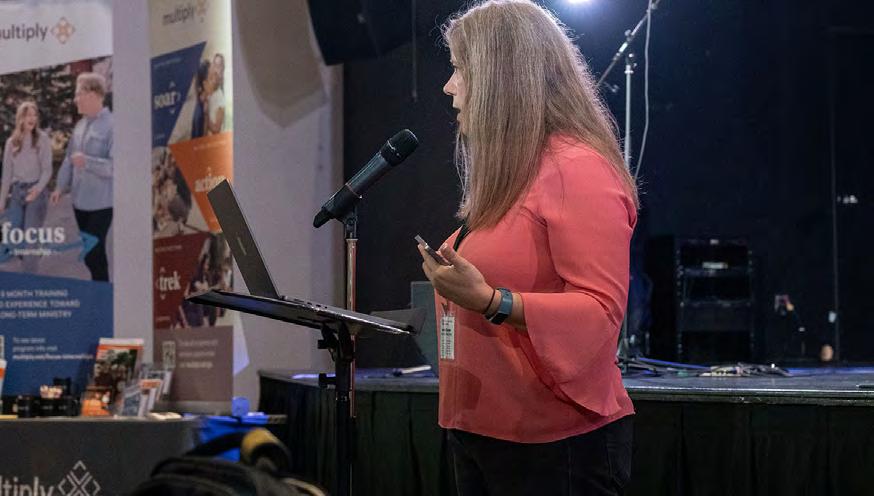
Each evening, participants went out to eat together, cheer on the “Winnipeg Goldeyes,” or walk at the Forks. The event concluded with each participant sharing what most impacted them from the days together. Besides the input sessions, many spoke of their appreciation for the opportunity to get to know other pastors/leaders from across the country. The event concluded with a “graduation ceremony,” and the receiving of a formal certificate of completion.
PCO is a required part of the credentialing process overseen by each provincial MB conference. PCO 2024 is already in the planning stages and will be located in British Columbia. Updates will be available online as available.
>> Visit the PCO website here
Need help subscribing to the online digest? Email us at mbherald@ mbchurches.ca, or call 1-888-669-6575 and ask for Carson or Liam. 4 MBHERALD.COM JULY 2023
MENNONITE DISASTER SERVICE

SERVING AS A COOK WITH MENNONITE DISASTER SERVICE “IMPORTANT AND FULFILLING”
Judy Schmidt likes to cook—even for 20 or more people at a time.
That’s what the 66-year-old retired banker was doing in March, where she served as head cook for a month with Mennonite Disaster Service (MDS) in Jennings, Lousiana.

For Schmidt, who attends the Selkirk, Man. Community Church (Mennonite Brethren), it was
the seventh time volunteering with MDS, all except one time as a cook.
Prior to going to Jennings, where volunteers are repairing damage to houses from hurricanes Delta and Laura in 2020, she served in Florida, South Dakota, California, South Carolina and Mississippi.
“It’s a big job preparing breakfast and supper for 20-25 people each week,” she said. “But it’s important and fulfilling. Volunteers need lots of good food to be able to serve each day.”
A typical weekday as a cook finds her rising at 5 a.m. to get breakfast ready. “It’s get up, wash, brush my hair and teeth, get dressed and go,” she said.
In addition to making breakfast, Schmidt and the assistant cook—in Jennings, it was Marian Minninger of Stuarts Draft, Virginia—get things like bread, butter, cold meat, vegetables, drinks, cookies, chips and other items ready so volunteers can make their lunches at 6:30 a.m.
After breakfast and devotions, volunteers leave for work about 8 a.m. Then it’s time for clean up and to think about supper.
Read the full story at MBHerald.com
5
Judy Schmidt (L) with Marian Minninger in Jennings, LA
BRETHREN HERALD JULY 2023
MENNONITE
Q&R corner
Q&R corner provides responses to questions that readers may have about CCMBC and its work collaborating with provincial MB conferences in areas of spiritual health and theology, leadership development, mission, and organizational health in order to achieve the overall mission: “To cultivate a community and culture of healthy disciple-making churches and ministries, faithfully joining Jesus in his mission.” If you would like to contribute a question, please send it to questions@mbchurches.ca
Please note that we will not be using your name in the MB Herald Digest in order to respect those who prefer anonymity. There may not be space to respond to every question—and sometimes we might not really have the ability or authority to respond to some questions (for example, those that relate more directly to one of our provincial MB conferences or to a local church leadership). We apologize in advance if we are unable to publish a response to your specific question.
The Q&R Corner began as a way for MB Herald Digest readers to ask questions about CCMBC and its ministries. The June 2023 column available here responded to questions about the Fall 2022 issue of Direction which highlighted the Rich Janzen and Brad Sumner “Using the Confession of Faith” study.
In my June 2023 column I expressed that my first response to the study was both “thankfulness” and “curiosity” with the hope that we can learn more about what it means to be increasingly faithful to Jesus and healthy in how we and our churches use the gift that we have in our MB Confession of Faith. It is for that reason that I am pleased that Rich Janzen has put in significant effort to provide a response to the June 2023 column.
In my column, I took issue with two statements that were in Rich and Brad’s concluding paragraph describing what appeared to be the key takeaways from the study. I questioned the validity and meaningfulness of the first statement—"The range of pastoral perspectives demonstrates that congregations have no uniform way of thinking about or acting out the Confession of Faith” (157). It sounded to me like an overarching “diagnosis” of our Canadian MB reality. I also questioned another concluding statement that described how the study might help
MB denominational leaders “learn to live with diversity and difference” (157). I referred to this as a suggested “treatment plan” in light of the diagnosis—and wondered whether learning to live with diversity and difference might not always be the best response since it depended on the level of diversity present. My concerns were primarily in reference to these two concluding statements.
I did not mean to imply anything about the study’s purpose or intention (neither word shows up in my article in reference to the study or the researchers). I was not questioning the integrity of the researchers or the methodological integrity of the study (although I still have some questions about sample size and such). I am very sorry to Rich and Brad if they experienced my comments as questioning their integrity. I am glad that Rich has responded with the article to clear up any misunderstandings and to let readers hear responses to the concerns I raised.
Thank you to the MB Herald Digest for sharing Rich’s response. I hope that the publication of both columns will nurture more conversation among us about how the MB Confession of Faith can and should function to help us become “healthy disciple-making churches…, faithfully joining Jesus in his mission” (CCMBC Mission statement).
Ken Esau, National Faith & Life Director
THE NATIONAL LEADERSHIP’S RESPONSE IN THE MB HERALD DIGEST TO THE CONFESSION OF FAITH STUDY
A REPLY FROM RICH JANZEN
appreciated the question in the Q&R section of the MB Herald Digest June 2023 issue. The question asked national readers to responsd to the recent Direction issue dedicated to a study about how MB congregations use our Confession of Faith. The question helped to bring out another important perspective in the conversation surrounding this topical issue.
I was co-lead of this study together with Brad Sumner. As with all my research, I welcome engaged and critical reaction to the study process and findings, particularly among those at the heart of the issue. I was therefore pleased to be asked to be co-guest editor of the special Direction issue where the study would not only be summarized, but where we would also hear reaction to the study through a series of seven response articles. National leaders were among the original list of about 20 people invited to respond - they were also invited to add other names to the list in order to gain well-rounded perspectives. While no CCMBC response came at that time, it was encouraging to see Ken Esau’s response now.
Unlike the response articles in Direction where I provided editorial feedback, I had not seen Ken’s response prior to it being published. If I had, I might have helped to clarify some misconceptions of the study in his response. I hope to clear up these now so that further conversation can be as accurately informed as possible.
In my teaching and training on research I often mention this slogan: The main thing is to keep the main thing the main thing. I then explain that in research the main thing is the purpose statement. From it flows decisions about the main research questions, methods, sampling, data analysis, sharing of findings, and more. You also assess the quality of research in light of its stated purpose. Given its central importance, it’s unfortunate that in Ken’s response the study purpose was misrepresented.
In his summary of the research Ken states the study’s intent was to offer a “diagnosis” and then a “treatment plan” related to our MB family and the Confession of Faith. Such a characterization implies that the study’s purpose was deterministic - some sort of expert-driven assessment. It was not. Below is the actual purpose statement that was discussed, revised, and eventually agreed upon by the study’s advisory
committee. This statement (and the three main research questions that flow from it) is found both in the Direction lead article and the publicly available summary report slides.
The purpose of this research is to explore the diverse ways that Canadian MB congregations have used and are using the MB Confession of Faith in congregational life. This exploration is seen to be potentially helpful in supporting congregational, provincial, and national leaders’ efforts to facilitate broader engagement with the Confession and to teach MBs how to live with diversity and difference. (p 144)
First notice that this was exploratory (not deterministic) research. It was more inductive than deductive. Its intent was to gain in-depth understanding about something little known. Such exploration lends itself to qualitative methods which are more concerned with interpretive meaning than with objective measurement. Notice also that the use of the research was not to prescribe solutions but rather to facilitate further engagement. And so, if you would like two words to describe this study’s purpose then perhaps “explore” and “engage” could work. Consider how different that is to framing the research as a “diagnosis” and “treatment plan”.
To be clear, I have done my share of deterministic research, typically in the form of summative evaluation. And I’ve designed the research accordingly (always in a collaborative way), including using quantitative methods with multivariate statistical analysis. But this study was not that. And for the sake of integrity, it should be judged according to what its purpose actually was.
When assessing the study, it is also important to understand that it used a community-based approach to fulfill its purpose. By community-based I mean that the research strove to uphold both academic excellence and community relevance and did so in a way that reflected the three hallmarks of this approach: community-driven, participatory, and action-oriented.
It was community-driven in that it was curious pastors (not external researchers) who initiated the study idea and directed the research agenda. Brad Sumner was one of those pastors who stepped up to co-lead the project. And other pastors were involved in other ways (see below). It was these pastors who also found the resources to get the study done.
It was participatory in that the initial pastors
SPIRITUAL HEALTH AND THEOLOGY 7 MENNONITE BRETHREN HERALD JULY 2023
I
invited other stakeholders to be involved. One key mechanism was to facilitate input from a cross-stakeholder advisory committee to guide each step of the research process. This advisory committee included other MBs from across the country: pastors, educators, former and current CCMBC staff, and a National Exec Board member. You can see their names in the summary report slides. Another mechanism was the use of peer researchers and an open forum (but more about these below).
It was action-oriented in that its purpose was pragmatic, not only gaining new insight but also engaging others to react to and use the research results. The Direction special issue was one avenue to encourage this action. Other avenues included an on-line open forum held for all research participants and interested others, and a special presentation to the NFLT.
This approach is important to mention to further make the point that Brad and I were not in the business of making expert pronouncements. Yes, I was invited into the project because of my expertise in community-based research (140+ academically and non-academically funded projects over 30 years).
But my (and Brad’s) role was to facilitate a collaboration of people who together wanted to systematically explore this topic further and invite others with a stake to do the same. You could say that this relatively small study was trying to mirror “the change we wished to see” in trying to better understand each other’s perspectives, even as we navigated the tricky waters that diversity of (sometimes passionate) opinion can bring. Those involved in the study can offer their thoughts about the extent to which we achieved those aspirations. But consider the perspective of Richard Lougheed an MB educator from Quebec and member of the study’s advisory committee, who wrote one of the response articles in Direction: “I was hesitant to agree to participate in the proposed study. However, as I became more involved in the study, I was impressed with the seeming consensus on approach, questions, and conclusions despite considerable theological diversity. That made
me surprisingly hopeful that [our] MB background might provide greater understanding to help reconcile theological diversity.” (p 195)
With that as a long-winded backdrop, what does this clearer understanding of the study purpose and approach mean for the five methodological concerns raised in the MB Herald Digest ? Can we now see them in a new light?
First, is the concern about sample size. Can 17 interviews be enough for such an exploratory study? The answer is yes. At least if participants were carefully chosen to reflect the range of perspectives of what is trying to be understood. The project advisory committee was key in helping to determine such purposive sampling criteria. Furthermore, in qualitative research the concept of “saturation”, not statistical analysis, is used to guide sample size - saturation being the point where more interviews would not lead to new learning. Would we have learned more with more interviews? Perhaps. Yet the reoccurring themes with thick description beginning to arise out of the 140+ transcript pages suggested that data saturation in answering the study’s three main research questions was close at hand if not already reached. This conclusion has support within the qualitative research literature where it is not uncommon for 17 interviews to be considered sufficient for saturation.
Second, is the concern of generalized conclusions. By now this point should be obvious. Did this study provide a conclusive diagnosis of the entire MB denomination? No. It was never intended to be generalized in that way. Having said that, in qualitative research there is the notion of “transferability”. If you sample well (as I think we did), the findings could well be applicable to the whole. It is up to those in the broader context (in this case other MB congregations) to discern the extent to which that is true. And that is why it is so important to facilitate open conversation following an exploratory study – to better understand how the insights from the 17 congregations are reflective of the denomination as a whole.
We will ask that the conclusion in the online version of Direction be edited to make this point more strongly.
Can 17 interviews be enough for such an exploratory study? The answer is yes. At least if participants were carefully chosen to reflect the range of perspectives of what is trying to be understood.
Third, is the concern that finding uniformity should not be surprising. In light of the clarification about the actual study purpose, this point should no longer be a methodological concern. Simply put, yes, we were not surprised that we did not find uniformity. Yes, we did expect diversity of opinion – that being written right in the study purpose statement. Remember that the study aimed to explore more deeply and
8 MBHERALD.COM JULY 2023 SPIRITUAL HEALTH AND THEOLOGY
“ ”
systematically “the diverse ways that Canadian MB congregations have used and are using the MB Confession of Faith in congregational life.”

Fourth, is the concern of the challenge of identifying Confessional uniformity. Again, this was not the goal of the current study. But as Ken acknowledges, the current study certainly has unearthed questions about the relationship between, and the limits of, uniformity and diversity on Confessional matters. This might warrant future exploration. The summary report slides end with a series of questions that might be helpful to that end. So rather than a concern, this point is perhaps one legacy of the study.
And finally, fifth is the concern of peer researcher bias. In other words, was it appropriate to use other MB pastors as interviewers? Here again I can offer a clear yes. But again, with a caveat – that proper training be done. The Centre for Community Based Research (CCBR) which I lead, has hired, trained, and supported hundreds of peer researchers in its 40-year history (CCBR is a nonprofit organization located on the University of Waterloo campus). Peer researchers have had lived experience on a range of social issues: homelessness, newcomer settlement, mental health and substance use, Indigenous justice, community violence/conflict, and many more. We have involved peer researchers because it can improve the quality of interviews particularly on sensitive topics, where rapport and trust help participants to speak more freely, and where shared lived experience can aid in the probing for deeper insight. There is a growing body of academic literature to support this claim (which I have contributed to) and that also points out cautions and limitations. Training is important to address these cautions. After all, in qualitative research it is the interviewer that is the “instrument”—the quality of the data is dependent on how well the conversation is facilitated to answer the questions. This is in contrast with quantitative research where the survey/questionnaire tool is the “instrument” with data quality dependent on how well the tool was designed and consistently implemented. As I listened (with participants’ consent) to the 20+ hours of interview recordings, I heard first-hand the benefits of having pastor to pastor conversation to deepen the exploratory conversation. So rather than viewing peer researchers
as a weakness, they can actually be a strength for a study of this kind and purpose.
Taken together, the points above should allay the specific concerns about the study methodology outlined in the MB Herald Digest article. That is not to say that the study was without limitations (all studies have limitations). Those limitations were clearly laid out in the Direction lead article and the summary report slides. And we certainly invite critique of this study, as all researchers should. But the critique should be based on what the study is, not on a misunderstanding of its purpose.
I will leave it to others with more pastoral and theological insight to comment on how this misunderstanding of the study purpose might have impacted the second half of the MB Herald Digest article which discusses the study findings. Perhaps that response too may need some re-thinking.
One final word. Ken does acknowledge (quite eloquently) some contributions of this study, including that through it we have been “gifted with some information that could help us understand our pastors better and by extension our churches” (p 8). I would like to acknowledge the collective effort of that gift-giving. While the grant from the MB Historical Commission was welcome, it was modest. It paid for a small portion of time of one CCBR staff to help with the technical aspects of the research and a CMU student to conduct a literature review. The remaining effort was entirely in-kind—from advisory committee member participation, to peer researchers who in most cases arranged and conducted multiple interviews, to Brad’s considerable involvement as project co-lead, and of course to the 17 pastors who made the effort to prepare for the interview and took time from their busy schedules to participate in it. My own involvement was entirely voluntary. I estimate the initial grant investment was multiplied ten-fold.
I mention this to direct recognition to where it is due and to add my gratitude to those who risked being curious together and who cared enough about the MB family to be engaged on a challenging topic. They can be assured that the study strove to uphold standards of quality in rigorous research.
I trust this response helps to clear up misconceptions of the study and spark further dialogue in a way that advances our ministry of reconciliation and peace.
SPIRITUAL HEALTH AND THEOLOGY 9 MENNONITE BRETHREN HERALD JULY 2023
RICH JANZEN is a member of Waterloo Mennonite Brethren Church. He is Executive Director of the Centre for Community Based Research and Adjunct Associate Professor at Conrad Grebel University College.
CHURCH IS A MISSION
BY FRED LEONARD
remember leaning over a fence with Harold Ens—my former boss and the Latin American Director, before he became the General Director, of our mission board—and telling him that if for some reason my wife Esther and I didn’t return to Bogota, Colombia, as missionaries, we would plant the best missions-supporting church ever in North America. The mission did stop sending people back to Latin America, and we planted Mountain View Church in Fresno, California, in 1993. We sent our first short-term missionaries out before our first gathering which was May 1, 1994. Our first long-term missionaries left eight months later for Lithuania on January 1, 1995. I don’t think we actually have become the best missions-supporting church ever, but still strive toward this God-inspired goal. Let me share with you seven ways we have sought to be a church on mission.
BURN WITH PASSION FOR THE GLORY OF THE LORD
When we choose to seek the presence of God we get a glimpse of His glory. When God does grant us a glimpse of his glory, he reminds us of the wonderful truth of his goodness and faithfulness, that “nothing is impossible for the Lord.” As the Westminster Shorter Catechism tells us, “Man’s chief end is to glorify God and enjoy him forever.” When we are
overcome with the glory of the Lord, we want to see that glory come to the nations. We read the Bible and see that God’s heart is to save the world. He is a missional God. That affects everything we do in our personal life and in the life of the church.
PRIORITIZE THE GOSPEL
There is nothing worth preaching besides the gospel—that Jesus truly is the way, the truth, and the life. We are headed to eternal death apart from the death and resurrection of Jesus, but Jesus died in our place to pay the penalty for our sins and take on the curse of sin, the wrath of God, for us. This is the good news! Thus, it is up to us to proclaim this gospel in word and in deed through every aspect of our lives. All is that we do to help and serve people is the outworking of the gospel, not the gospel itself. This laser focus keeps all we do centered on God’s glory and reaching the world with his gospel of grace.
PRIORITIZE PRAYER
It has been said that “prayer moves the hand of God.” I would add, “Prayer is where we get our marching orders from the Lord of Heaven’s Armies.” It is our conversational lifeline to our headquarters. Living the mission God has given us includes three parts: going (living the Great Commission),

10 MBHERALD.COM JULY 2023 MISSION
I
giving (funding the Great Commission), and praying (empowering the Great Commission). We have to be people of prayer, people who pray. We accomplish this mission on our knees, spending uninterrupted time with the King of Kings, listening to what he tells us to do. To be missional means being a church that is a house of prayer for all the nations—not a house of action! We need to be a “Mary” church sitting at the feet of Jesus, not a “Martha” church running a business-type power organization. Prayer is about the presence of Jesus—we need his presence.
PRIORITIZE PEOPLE COMING TO FAITH IN JESUS AND SACRIFICE EVERYTHING TO SEE IT HAPPEN
All that we do must focus on the goal of people saying yes to Jesus. If we love God and love people we have to tell them the truth of where their eternity lies. We are compelled by love to share the only hope any of us have which is turning from our sin and turning toward Jesus. Therefore, every activity and program in the church must be evaluated by its effectiveness in reaching people for Jesus. We do whatever it takes to reach people and put all we have into it.
That does not mean we don’t prioritize discipleship—we know that the true disciple lives under a passion to glorify God, and that happens best as people come to faith in Jesus. If there is no passion for the lost to be found throughout the globe, then discipleship has not happened. Hence, we call people to salvation at every Sunday gathering, we train people to know how to share Jesus with their friends, we share faith stories on Sundays, and we take time to pray for the wins and losses of the body of Christ throughout the world. This “missions moment” each gathering is a way to highlight what the Lord is doing as we go, give, and pray, and it also helps create a missional DNA throughout the faith family. Missions weeks, conferences, and local events are key in engaging the church in their own spheres of influence and the world. We want to live out Paul’s words in 2 Corinthians 4:15, “All of this is for your benefit. And as God’s grace reaches more and more people, there will be great thanksgiving, and God will receive more and more glory.”
There is nothing that we are not unprepared to give up for the sake of lost people. It is an honor to give up our time, money, and abilities for the global lost.
DO CHURCH PLANTING AMONG THE UNREACHED AND LEAST REACHED

We want to go to the hard places, where there are 2% or less evangelical Christians. When God calls us, he calls us to those who have never heard his good news. All the easy places are taken. Only the places where it is hard to see people come to faith are left, where other false religions are entrenched and hostile to followers of Jesus. God is calling us to play a role in leading these people to Jesus.
SAY “ YES” TO EACH OPPORTUNITY GOD BRINGS TO YOU, WALK BY FAITH AND TAKE RISKS
God brings us opportunities, however, we have to say yes to them. We ask God, “who do you want me to minister to today?” Saying yes means living in risk and faith, being ready to embrace the mystery of God. God owes us no explanation, but we owe him our obedience. Jesus was not in the habit of explaining to the disciples why he wanted them to do what he asked—he expected them to walk by faith and obey. It is the same today. We should never, ever say no to Jesus!
CELEBRATE WHAT GOD IS DOING
We should celebrate what Jesus is doing. We should yell, clap and cheer when people get saved, when great reports come in, when miracles happen, when the good news is shared, when churches are planted, and so much more. We should be a place that celebrates the victories of God in the world. What we reward, celebrate, and champion, we get more of. Let’s celebrate reaching God’s world for his glory.
If you would like to join us for our Live The Mission Conference, which will include speakers like Tracy Evans of iReach Africa, Stephen Mairori of International Christian Ministries, and Dick Brogden of Live/Dead, you can find more information at mountainview.org Let’s live the mission together.
FRED LEONARD
is the lead pastor at Mountain View Church in Fresno, CA and serves with his wife Esther who is the pastor of prayer. His passion is for the gospel to be proclaimed throughout the world-locally, nationally and globally, for the lost to come to salvation, and for churches to be planted. Mountain View Church partners with 406 assets (national workers) in 36 countries.
MISSION 11 MENNONITE BRETHREN HERALD JULY 2023

ORG U P HEAL THBEN E STIF MORT GAGES SNEP I O NADMINISTR A NOIT P A YROLL SERVI C E S CCA O UNTIN G SER V I SEC INVEST MENTS CES U RITIES DONA T I SNO $ (Cash, TFSA, RRSP and RRIF accounts) CCMBC Legacy Fund serves pastors and churches by helping with administration and finances to free you for ministry in your local community. You weren’t called to do paperwork. We were! Are you juggling responsibilities? We exist to provide ministry-focused financial services to facilitate Kingdom Growth. Visit ccmbclegacyfund.com to learn more. Phone 1-888-669-6575 Email legacy@mbchurches.ca Investing in Kingdom Growth Together.
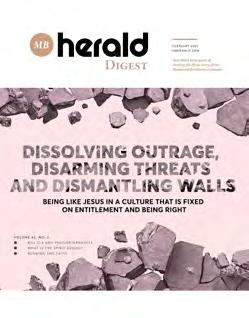
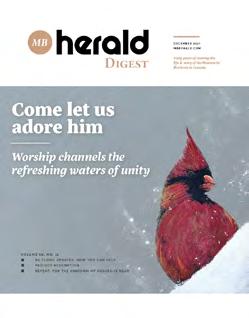




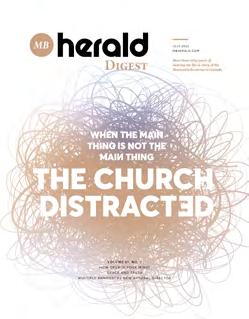
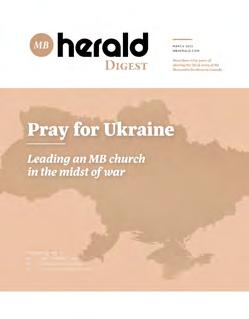

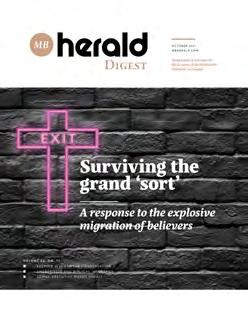

13 MENNONITE BRETHREN HERALD SHARE THE MB HERALD DIGEST WITH YOUR FRIENDS SIGN UP FOR THE MB HERALD DIGEST AT MBHERALD.COM/SUBSCRIBE OR CONTACT US AT (888) 669-6575 MBHERALD@MBCHURCHES.CA THINGS ARE BETTER WHEN THEY’RE SHARED
mbchurches
Liked by miabliss and others
mbchurches
Modern idolatry, ancient lies
#instagram #socialmedia #unknowngod #lost
14 MBHERALD.COM JULY 2023
BY VIC NEUFELD
Luke tells us in Acts 17 that Paul while touring Athens, was distressed because the city was so full of idols that they even designated one monument to the “Unknown God,” just in case they might have missed one. In the post-Christian West, we naively consider ourselves more sophisticated, believing that most modern people either worship one God or, increasingly, no God - or so we think.
Five hundred years ago, John Calvin wrote that the human heart is an idol factory. We all struggle with taking the good things God has made to enjoy, like beauty, sex, careers, money, romance, and the like - and elevating them from being a ‘good thing’ to the ‘ultimate thing.’ When we cling tighter to the good things God has made rather than to Himself, who made them, our hearts have manufactured an idol. Essentially, we’ve bent the knee to a new lord whose name isn’t Jesus.
Colossians 3:5 points out that greed, which is at the root of most sins, including those listed in the verse, is idolatry. Greed says, “I must have more - God has not allotted enough money, sex, power, comfort, etc., to me.” Greed compels us to bend the rules, overwork, manipulate, or trample over others to acquire more.
It’s true; our idols aren’t carved in stone. We don’t go to temples to worship stone gods—no need for that. Big tech has miniaturized the ancient
Pantheon (a temple in Rome dedicated to worshipping all Roman gods) to fit in our pockets. We strain our necks, curve our backs, and tightly wrap our hands around our smart devices, often oblivious to the real, beautiful world all around us if only we’d look up.
Who hasn’t seen a young couple on a dinner date, silent with each other while flirting with their screens? Who among us, when bored in line at the grocery store or being uncomfortable at a dinner party, instinctively reaches for our phones, desperately looking for a new headline (and by new, I mean newer than the headline we read 5 minutes ago)? I’m not alone in sensing our attention span getting shorter, our faceto-face conversations becoming scarcer, and our moments of meaningful solitude eluding us together. How many of us fall asleep on Twitter or YouTube and, upon waking, reach for our phones once again? When was the last time you read a whole book? When did you last go a month, week, day, or even a single waking hour without looking at your phone?
How has big tech pulled off the biggest caper of all time –hustling modern humanity to trade a scrumptious banquet for a bag of chips?
In his book Stolen Focus: Why You Can’t Pay Attention – and How to Think Deeply, Jonathan Hari again makes a compelling case that it’s all by deliberate design and manipulation. Since Facebook, Twitter, Instagram, TikTok, and the like are free, users are viewed not as customers but as products. Those companies profit by selling you to their real customers – the advertisers. The more often we use their platforms, the more money they make. They have an army of psychologists and behavioural scientists to design their apps to get us hooked.
In the 2020 Netflix documentary “The Social Dilemma,” one of the regretful architects of the technology used to these ends tellingly quips that only two industries refer to their customers as “users”: drug dealers and social media companies.
Jonathan Hari interviewed Aza Raskin – someone no one had ever heard of. Yet, Aza has changed your life. Aza invented the infinite scroll function used by almost every app and website. When scientists analyzed the effects of Aza’s
15 MENNONITE BRETHREN HERALD JULY 2023
An obvious challenge for a believer in Jesus is to examine our hearts to see if the constant barrage of promoted idols streaming from our phones is more effectively shaping our affections than the Holy Spirit. All of us would do well to do this often.
invention on how long the average user spends surfing an app or the web, they found that users, conservatively, take 50% more time. Aza calculated that his invention caused people on earth to waste an additional 200,000 human lifetimes from birth to death, frivolously scrolling through their screens daily. Aza feels his creation has hijacked his life. Even Satan must be respectfully envious of big tech’s proficiencies in enslaving image-bearers to frivolity.
In a hilariously sad study done by the tech giant HP on the effects of perpetual distraction, Hari wrote, “At first, they tested their IQ when they were not being distracted or interrupted. Then they tested their IQ when they were receiving emails and phone calls. The study found that ‘technological distraction’—just getting emails and calls—caused a drop in the workers’ IQ by an average of ten points. To give you a sense of how big that is: in the short term, that’s twice the knock to your IQ that you get when you smoke cannabis. So this suggests, in terms of being able to get your work done, you’d be better off getting stoned at your desk than checking your texts and Facebook messages a lot.”
An obvious challenge for a believer in Jesus is to examine our hearts to see if the constant barrage of promoted idols streaming from our phones is more effectively shaping our affections than the Holy Spirit. All of us would do well to do this often. Most of us will
have areas to confess, repent, and change course.
Yet, a less obvious risk to our soul bears a painful examination. What if the very nature of the smartphones’ effect on our brains—the quick access to distraction, entertainment, social engagement, and interruptions—is the very thing that robs us of a deeper, life-giving connection with Jesus? Science already tells us that phones are stealing our sleep, shallowing our relationships, chipping away at our productivity, raising our anxiety, intensifying our depression, increasing our envy, amplifying our anger, widening our divisions, obliterating our concentration, and decreasing our enjoyment of the real world just inches beyond the screen.
Less than a year ago, I struggled with anxiety, languished with insomnia, and was stuck in my devotional life. I was also a Twitter devotee. I loved being connected to the conversations enveloping the world in real time. I became addicted to being absorbed into the day’s storylines—before they even hit the headlines. I followed preachers, politicians, philosophers, and scientists. I enjoyed the outrage that welled inside me upon reading a controversial tweet. It was intoxicating. Twitter greeted me in the morning and tucked me into bed at night. One morning, I received an email from Twitter congratulating me on my 11th anniversary as a user. Instantly, a wave of shame followed by anger overcame me, and I knew what I had to do. I canceled my account before I even got out of bed. My chains were gone; I had been set free.
I was stunned at how quickly my life changed. Within days, my insomnia almost disappeared entirely. My anger and anxiety levels went down. I became a more relaxed person.
A few months later, while on a sabbatical, I made a further change. I decided to put my phone down in public. I resolved to use my phone only as a tool for maps, recipes, or other critical information and communication – and not as a digital drug to mask awkwardness, boredom, or social engagement. It was a jarring yet life-giving change. It’s like I had swallowed the red pill and vomited out of the matrix. I was travelling in Southeast Asia and noticed that almost everyone around me was glued to their devices while walking down busy streets, eating meals, or travelling on subways. Once, in a crowded subway car, I was overcome by how
16 MBHERALD.COM JULY 2023
everyone was glued to their phones. I looked around and felt an overwhelming sadness for them and the previous version of myself. Then, I locked eyes with an old Thai man – the only other person in the train car enjoying the world around him. We nodded to each other, shared a moment, and smiled. We both understood the absurdity of the digital heroin addicts all around us. I’m never going back to the connected world.
In my adult life, I’ve never been less anxious, more content, less caught up in tensions and crises in my church or global events, less angry, and more aware that God is good, in control, and loves me and others very much.

From the hymnal Jesus would have sung, we read:
“God is our refuge and strength, an ever-present help in trouble. Therefore, we will not fear, though the earth gives way and the mountains fall into the heart of the sea, though its waters roar and foam and the mountains quake with their surging.” (Psalm 46:1-3)
I enjoyed the outrage that welled inside me upon reading a controversial tweet. It was intoxicating. Twitter greeted me in the morning and tucked me into bed at night.
Not only do we short-circuit what God has for us, but we also lose sight of what He’s doing all around us.
“Nations are in uproar, kingdoms fall; he lifts his voice, the earth melts. The LORD Almighty is with us; the God of Jacob is our fortress. Come and see what the LORD has done…” (Psalm 46:6-8a)
Do we ever take the time to see what the Lord has already done if every negative emotion is instinctively soothed by our smartphone god rather than God, the maker of heaven and earth?
“He says, ‘Be still and know that I am God…’” (Psalm 46:10).
Do you still have the ability to obey this command? Try it. Try it right now. Set the alarm for just 10 minutes. Turn off your phone, put aside every distraction, and take 10 minutes to be still and focus on knowing who God is. Dare to try?
How did it go? If you managed it, I’m biblically confident it was life-giving. If you struggled mightily – if 10 minutes seemed like 10 hours – perhaps this is a canary in the coal mine, alerting you that the tyranny of your beckoning phone has sucked up the oxygen of your inner spiritual life?
Life is sometimes difficult with all its challenges, crises, insecurities, betrayals, and heartaches. These fears feel like mountains crashing into the sea throughout the day, shaking our foundations. When faced with these things, we rightly seek comfort and assurance – and as the hymn says, we should turn to God as our refuge and strength. Sometimes we do. Yet often, we can find a quick hit of easy comfort by focusing on our devices instead of God.
17 MENNONITE BRETHREN HERALD JULY 2023
VICTOR NEUFELD is the lead pastor at North Kildonan MB Church in Winnipeg.
Moments in prayer
HOLY SPIRIT—FILL US WITH YOUR GOODNESS
BUT THE FRUIT OF THE SPIRIT IS...GOODNESS…. (GALATIANS 5:22)
GOD SAW ALL THAT HE HAD MADE, AND IT WAS VERY GOOD. (GENESIS 1:31)
THE LORD IS GOOD, A REFUGE IN TIMES OF TROUBLE. HE CARES FOR THOSE WHO TRUST IN HIM. (NAHUM 1:7)
FOR THE FRUIT OF THE LIGHT CONSISTS IN ALL GOODNESS, RIGHTEOUSNESS AND TRUTH. (EPHESIANS 5:9)
FOR THIS REASON, MAKE EVERY EFFORT TO ADD TO YOUR FAITH GOODNESS…. (2 PETER 1:5)
ur July prayer focus is on prayers for the Holy Spirit to fill us with Goodness. This is the sixth quality in the fruit of the Spirit list we find in Galatians 5.
In 2023, ONMB pastors have been working through Scot McKnight and Laura Barringer’s book entitled A Church Called Tov. Tov is the Hebrew word for “good” or “goodness.” When God created the heavens and the earth, he called it good –tov. "Tov suggests what is visually pleasing and pleasant, what is desirable, what is of high quality and what is excellent" (88). Barringer and McKnight proceed to define being tov as "to be a person who from the inside out consistently does what is good and generous" (90).
A person or church of goodness always puts the care and honour of others first, ahead of efficiency, metrics or institution building. We want to be a people of goodness! We know that ultimately it is an experience of goodness that draws people to a life-long, abiding life in Christ. But it is easy for churches and leaders to sacrifice goodness on the altar of ministry success.
The past number of years have felt like a constant barrage of sad news stories in the broader church culture about fallen leaders who have abused power. While increased media attention magnifies this reality, it is not a new story. Our hearts
JULY, 2023
18 MBHERALD.COM JULY 2023 SPIRITUAL HEALTH AND THEOLOGY O
yearn, "Oh God! Pour out your goodness upon us. Replace these filthy rags of using people as a means toward an end." No doubt, we have our own stories of power being used in harmful ways for the sake of building ministry success.
As we pursue goodness in ourselves and in our churches, it is critical to remember that we can't create this on our own. It is the Holy Spirit who forms it in us and in our church families. We are not called to fashion the fruit of the Spirit by our own efforts. Rather we are called to tend to the tree that produces the fruit, which is our life in the Spirit, keeping in step with the Spirit (Galatians 5:16, 25).
And so, we turn to the Holy Spirit and invite Him to form the fruit of goodness in our lives.
CONSIDER:
˚ In what ways have you experienced God's goodness in your church family? Spend time worshipping God by thanking God for this goodness.
˚ Spend time expressing to God grief over times when the church has not demonstrated God’s goodness.
˚ In what areas of your life could you use a new dose of God's goodness?
˚ How might you make every effort to add goodness to your faith? (cf. 2 Peter 1:5)
PRAY WORDS OF INVITATION AND WELCOME TO THE HOLY SPIRIT FOR YOUR OWN HEART:
˚ Welcome Holy Spirit! Come and fill me today with your goodness!
˚ Thank you that you are always good. Thank you that all you've created is good.
˚ Welcome Holy Spirit! I want to walk in step with you. Please form in me a persistent desire for goodness. I want to love what You love and be troubled by what You're troubled by.
PRAY WORDS OF INVITATION AND WELCOME FOR THE CHURCH:
˚ Welcome Holy Spirit! Please reveal where we've opted to pursue ministry success in ways that have abandoned your goodness. Grant us a spirit of dependence and draw us to repentance.
˚ We ask that you draw us into greater collective dependence upon you. May we sit in your presence. May we walk in step with you. May a life with you always precede our efforts, so that your goodness would flow to us and through us.
˚ Welcome Holy Spirit! May the watching world know us as a people where goodness is found.
RYAN JANTZI is the Interim Executive Director with the Ontario Conference of MB Churches. He lives in Wellesley, Ontario with Brittany and their four kids. They are a part of Maple View Mennonite Church and are also entering a new Missional Community expression of disciple-making.

SPIRITUAL HEALTH AND THEOLOGY
19 MENNONITE BRETHREN HERALD JULY 2023
NATIONAL FAITH AND LIFE TEAM
NEW TO THE MB CONFESSION OF FAITH: ARTICLE 1 EXPLANATORY NOTES (PART 2)
PREAMBLE:
The National Faith & Life Team (NFLT) is tasked with the provision of resources related to the MB Confession of Faith. They have taken on the task of updating the existing resources (viz., Commentary, Pastoral Application) that have been in use for over twenty years. In 2020, the NFLT began the long-term project of rewriting and updating the resources for each of the 18 articles in the MB Confession of Faith. The new resources will include Explanatory Notes and FAQ responses for each article.
The following is an excerpt of Article 1: Explanatory Notes. For the complete document see here.
If you have feedback and/or questions related to these Article 1: Explanatory Notes, please send them to listeningwell@mbchurches.ca
Thank you for your participation in this project.
Ken Esau
CCMBC National Faith & Life Director
GOD THE FATHER
God the Father is the source of all life. In Him we live and move and have our being.1 The Father seeks those who will worship Him in spirit and in truth, and hears the prayers of all who call on Him.2 In the fullness of time, the Father sent the Son for the salvation of the world. Through Jesus Christ, the Father adopts all who respond in faith to the gospel, forgiving those who repent of their sin and entering into a new covenant with them. God gives the Counsellor, the Holy Spirit, to all His children.4 God’s creative and redemptive love sustains this world until the end of the age.5
GOD THE SON
The Son, through whom all things were created and who holds all things together, is the image of the invisible God. Conceived by the Holy Spirit and born of the virgin Mary, Jesus took on human nature to redeem this fallen world.6 He revealed the fullness of God through His obedient and sinless life.7 Through word and deed, Jesus proclaimed the reign of God, bringing good news to the poor, release to the captives, and recovery of sight to the blind.8 Christ triumphed over sin through His death and resurrection, and was exalted as Lord of creation and the church.9 The Saviour of the world invites all to be reconciled to God, offering peace to those far and near, and calling them to follow Him in the way of the cross.10 Until the Lord Jesus returns in glory, He intercedes for believers, acts as their advocate, and calls them to be His witnesses.11
The Holy Spirit, the Counsellor, is the creative power, presence, and wisdom of God.12 The Spirit convicts people of sin, gives them new life, and guides them into all truth.13 By the Spirit, believers are baptized into one body.14 The indwelling Spirit testifies that they are God’s children, distributes gifts for ministry, empowers for witness, and produces the fruit of righteousness.15 As Comforter, the Holy Spirit helps God’s children in their weakness, intercedes for them according to God’s will, and assures them of eternal life.16
Genesis 1; Exodus 15:2-3; 34:6-7; Deuteronomy 6:4-6; Psalm 8; 23; 139; Isaiah 55:8-9; 66:12-13; Jeremiah 31:31-34; Hosea 11:1-4; Matthew 1:18-25; 5-7; 28:18-20; Mark 8:34-38; Luke 4:18-19; John 1:1-18; 14:26; 15:26; 16:7-15; Acts 1:8; 2:1-4; Romans 8:1-17; 1 Corinthians 12:4-7, 13; 15:3-8; 2 Corinthians 1:22; 5:16-21; 13:14; Galatians 5:22-23; Ephesians 1:15-2:22; 3:14-21; Philippians 2:6-11; Colossians 1:15-20; 1 Timothy 6:15-16; 2 Timothy 2:11-13; Hebrews 12:7-11; 1 Peter 2:21-25; 1 John 2:2; Revelation 5:5-6, 9-10.
20 MBHERALD.COM JULY 2023 SPIRITUAL HEALTH AND THEOLOGY
GOD THE HOLY SPIRIT
1. The New Testament sometimes refers to God the Father as simply God. Paul declared to the Athenian crowd that God “gives everyone life and breath and everything else” (Acts 17:25) and it is from him that “we live and move and have our being” (17:28). At other times, the NT writers use the expression “God the Father” especially when they are also making statements that involve Jesus. God the Father has “placed his seal of approval” on the Son of Man (John 6:27) and given Jesus “honor and glory” (2 Peter 1:17). God the Father will receive the kingdom from the Son “after he has destroyed all dominion, authority and power” (1 Corinthians 15:24). God the Father raised Jesus from the dead and together with Jesus “sent” Paul (Galatians 1:1). God the Father will be glorified when every knee bows and tongue confesses that Jesus Christ is Lord (Philippians 2:11). God the Father together with Jesus are called upon to send “grace, mercy, and peace” (2 John 1:3; 1: Timothy 1:2; 2 Timothy 1:2), “grace and peace” (1 Thessalonians 1:1; 2 Thessalonians 1:2; Titus 1:4), or “peace…and love” (Ephesians 6:23). God the Father is active in the New Testament, just as Jesus and the Spirit are active.
2. Jesus told the Samaritan woman at the well that the Father seeks “true worshipers” who “will worship the Father in the Spirit and in truth” (John 4:23). This kind of worship is a “must” because God is spirit (John 4:24). Paul declares that “there is no difference between Jew and Gentile” since God “richly blesses all who call on him” for “Everyone who calls on the name of the Lord will be saved” (Romans 10:12-13). The Psalmist writes that the “LORD is near to all who call on him” (145:18). God the Father is actively seeking worshipers and hearing (viz. responding) to the prayers of those who call on him.
3. The Father sends the Son for the salvation of the world (John 3:16; 6:44-45). The Father adopts into his family all who respond in faith to the gospel (Galatians 4:4-5); Ephesians 1:5). The Father forgives (Ephesians 1:7; Hebrews 8:12; 1 John 1:9) and welcomes the forgiven into a new covenant (Hebrews 8:7-12; Luke 22:20). The New Testament is not simply the story of Jesus but the story of God the Father actively working in the world, sending Jesus, adopting believers, forgiving sinners, and covenanting himself to this group. This story of salvation is described more fully in Articles 4 and 5.
4. The Father gives the Counselor (or Advocate who comes alongside believers; cf. John 14:26; 15:26; 16:7; Luke 11:13; Acts 5:32). John 14:26 describes the Holy Spirit using the word Paracletos which is most often translated as “Counselor” (RSV), “Helper” (ESV),
“Comforter” (KJV), or “Advocate” (NIV; NRSV). In this verse, Jesus states that the role of the Holy Spirit is to “teach you all things and [will] remind you of everything I [Jesus] have said to you.” Whatever word we choose to use as a translation for Paracletos must be understood within this role of active teaching and reminding.
Article 1 highlights how the Father gives the Paracletos (John 14:16) to every believer (Acts 2:38-39; Galatians 4:6).
5. Describing God’s creative and redemptive love as what sustains this world is a reminder of his transcendent governance over creation (Genesis 2:1-3; Job 38:19-30; John 5:17) and his imminent presence with believers (Deuteronomy 31:6; Psalm 41:12; 54:4; 55:22; 1 John 4:12). It is also evidence of the unified work of the Godhead, as Father, Son, and Spirit sustain the world (Matthew 28:20b; John 16:5-15; Colossians 1:17; Hebrews 1:3). All of creation and all of God’s ongoing work comes out of his love.
6. This section of Article 1 needs to be read in light of the earlier confession that God is “eternal Father, Son, and Holy Spirit,” and in light of the heading of this section—"God the Son.” These make it clear that Jesus has existed eternally as the Son within the Triune God (John 1:1; 17:5; Colossians 1:17) and thus did not become the divine Son at some point during or after his earthly life—even though his resurrection led to him being “declared to be the Son of God in power…by his resurrection from the dead, Jesus Christ our Lord” (Romans 1:4 ESV). Jesus, incarnated with human flesh, as the “image of the invisible God” (Colossians 1:15, 19; Hebrews 1:3) was, in a mysterious way, also the pre-incarnate Son of God “in [whom] all things were created” (John 1:3; Colossians 1:16; Hebrews 1:3). Article 1 affirms this divine-human union without providing clarity about how the eternal divine Son could take on the fullness of human flesh and human nature without diminishment of either the divine or the human. (For a discussion of “human nature,” see Article 3.)
Jesus’ conception by the Holy Spirit and birth to the virgin Mary demonstrates that the origin of the incarnate Jesus is from God (Luke 1:35) and is the very Immanuel presence of God (Matthew 1:22-23). From birth, Jesus is the “Son of God.” At twelve, he explains to Joseph and Mary that he stayed back at the temple because he “needed to be in [his] Father’s house” (Luke 2:49).
Although Jesus’ origin is from God, he took on the fullness of human nature/flesh (John 1:14; Romans
21 MENNONITE BRETHREN HERALD JULY 2023
8:3; 1 Timothy 3:16; 1 John 4:2; Philippians 2:6-8). Jesus’ taking on human nature/flesh means that he accepted human weakness (Hebrews 4:15; 5:2). Jesus “grew in wisdom and stature” (Luke 2:52), became hungry (Matthew 21:18), needed to sleep (Mark 4:38), did not know certain things (Matthew 24:36), and suffered when he was tempted (Hebrews 2:18). The author of Hebrews insists that Jesus had to be made “fully human in every way” in order to “make atonement for the sins of the people” (2:17).
7. Colossians 1:19 records the astounding claim that “God was pleased to have all his fullness dwell in [Jesus]” while Colossians 2:9 goes even further to says that “in Christ all the fullness of the Deity lives in bodily form.” Jesus was both the “fullness” of God (viz. character, essence, intention, will) and a reflection of this fullness in his life, ministry, teaching, suffering, death, resurrection, and ascension. Jesus revealed God in everything he did (John 1:1-18; 14:9-11). From birth to death, Jesus lived a fully obedient and sinless life (2 Corinthians 5:21; Hebrews 4:15; 1 Peter 2:21-25; 1 John 3:5).
8. What Jesus preached and embodied was all about the inaugurating of the “reign of God” or the “Kingdom of God” in his life, death, resurrection, and ascension. The New Testament writers explain that what Jesus proclaimed was the “gospel” or “good news” of the Kingdom (Matthew 4:23; 9:35; Mark 1:15; Luke 4:43; 8:1; 16:16; Acts 8:12; cf. Luke 4:18-19). (See Article 5 for more about the nature of the “gospel.”)
9. Jesus’ sacrificial death and victorious resurrection conquered sin, death, and Satan (Romans 5:18-21; 1 Corinthians 15:54-47; Colossians 2:15; Hebrews 2:1418; 4:14-16; 1 John 2:2; Revelation 5:5-10) and made fully true the statement: “All authority in heaven and earth has been given to me” (Matthew 28:17; cf. Philippians 2:9-11; Acts 2:32-36). Jesus is now also “head” of the Church (Colossians 1:15-20; Ephesians 1:20-23; 5:23). (For more detail about the various aspects of Jesus atoning work, see Article 5.)
10. Jesus invites every person in the world, both Gentiles who were “far” and Jews who were “near” (Ephesians 2:11-18; cf. Matthew 11:28; John 6:35-38), to reconciliation/peace with God (Romans 5:1; 2 John 1:3; 2 Corinthians 5:18-19). Jesus calls all those who respond to follow him in the “way of the cross” (Matthew 10:38; Mark 1:16-20; 8:34-38; Luke 9:23; 14:27).
11. Between Jesus’ ascension and his second coming when he will return in glory (1 Thessalonians 4:16-17; Hebrews 9:28: Revelation 1:7), he sits at the right hand
of God (Luke 22:69-70; Hebrews 10:12-14; 1 Peter 3:22), interceding and advocating for believers before the Father (Romans 8:34-35; 1 Timothy 2:5-6; Hebrews 4:14-16; 7:25; 8:24; 1 John 2:1) and calling them to be his witnesses in the world (Acts 1:8; Matthew 10:18; 2 Corinthians 5:20).
12. This section of Article 1 also needs to be read in light of the earlier confession that God is “eternal Father, Son, and Holy Spirit,” and in light of the heading of this section—"God the Holy Spirit.” This makes it clear that the Holy Spirit has existed eternally within the Triune God. The Holy Spirit is fully the presence of God – God is One - not some secondary offshoot of God. The Holy Spirit fully represents the power, presence, and wisdom of God (Matthew 10:20; 12:28; Mark 3:29; Luke 1:35; Ephesians 2:18).
As mentioned in Note 12, John 14:26 describes the Holy Spirit using the word Paracletos which is most often translated as “Counselor” (RSV), “Helper” (ESV), “Comforter” (KJV), or “Advocate” (NIV; NRSV).
There are some differences between how the Spirit is described as working in the Old Testament and the New Testament. In the OT, the Spirit only came upon certain people like prophets (Numbers 11:29; 2 Chronicles 24:20); leaders (Deuteronomy 34:9); judges (Judges 3:10; 6:24); anointed kings (1 Samuel 16:13); and skilled artists appointed to build the Tabernacle (Exodus 31:15). The Spirit provided physical power (Judges 11:29; 14:6, 19; 15:14), leadership ability (Numbers 11:24-25), wisdom (Deuteronomy 34:9), or prophetic ability (Micah 3:7-8; Ezekiel 11:5) to achieve God’s purposes. The Spirit could also come and go from a person as in the case of Saul (1 Samuel 16:14). David was also fearful of God’s Spirit leaving him (Psalm 51:11).
The New Testament connects the Holy Spirit directly with Jesus. The Holy Spirit “testifies about” Jesus (John 15:26), “glorifies” Jesus (John 16:14), and is identified as the “Spirit of his Son” (Galatians 4:6). The wonderful news is that with the coming of the Holy Spirit at Pentecost, he is now given to every disciple of Jesus (Acts 2:1-4, 16-18; cf. Joel 2:28-29) and will not leave us but “be with [us] forever” (John 14:16). The Holy Spirit gives each believer “gifts of the Spirit” for the “common good” (1 Corinthians 12:1-7).
Believers, whose bodies are “temples of the Holy Spirit” (1 Corinthians 16:19), are to “walk by the Spirit” (Galatians 5:16) “live by the Spirit” (5:25), “keep in step with the Spirit” (5:15), be “filled with the Spirit” (Ephesians 5:18), and demonstrate the “fruit of the Spirit” (Galatians 5:22-23). The Holy Spirit transforms character (2
22 MBHERALD.COM JULY 2023
Corinthians 3:17-18) so that believers can reflect God’s “love, joy, peace, patience, kindness, goodness, faithfulness, gentleness, and self-control” (Galatians 5:22-23). This Spirit, also called the “Advocate” or “Comforter” (John 14:26), will “teach you all things” (v.26), “be in you” (v.17), “guide you into all the truth” (John 16:13), and give you “life (John 6:63; Romans 8:10). If “anyone does not have the Spirit of Christ, they do not belong to Christ” (Romans 8:9).
We do not understand the Triune God, and especially Jesus, if we fail to appreciate the essential role of the Holy Spirit in the lives and mission of God’s people in the world. The Holy Spirit is also not an “it” but a divine person within the three persons of the Trinity. Among many other activities, the Holy Spirit speaks (Acts 13:2), gives out Spiritual gifts (1 Corinthians 12:11), intercedes for believers (Romans 8:26-27), and glorifies Jesus (John 16:14). These actions demonstrate that the Holy Spirit is a person not simply an impersonal force.

13. The Holy Spirit is involved in working in the hearts and minds of humans convicting them of sin (John 16:8-11). The work of convicting is motivated by God’s love with the goal of prompting confession, repentance, and restoration (Revelation 3:19). This should not be understood in the legal sense of “condemnation” which produces a separation from God’s love (cf. John 3:1718; Romans 8:31-39) but in the sense of God’s convicting love prompting people’s consciences, revealing truth about the human condition, and creating the desire to respond to this saving love.

Romans 8:2 declares that believers “are now controlled by the law of the Holy Spirit who gives [them] life.” Finally, John 16:13 confidently asserts that when the “Spirit of truth comes, he will guide you into all the truth.”
14. The Holy Spirit is active as believers are cleansed and baptized into one body (viz., the Church; cf. 1 Corinthians 12:13; 6:11; Ephesians 4:4). Because of this truth, we are to make “every effort to keep the unity of the Spirit through the bond of peace” (Ephesians
4:3). The Spirit unifies the Church.
15. The Holy Spirit indwells every believer (Acts 2:1-4, 38; 10:45; Ephesians 1:13; 5:18), gifts and empowers each one for ministries and witness (Mark 13:11; Acts
1:8; Romans 12:3-8; 1 Corinthians 12, 14; Ephesians
4:12-13; 1 Peter 4:10-11) and produces “fruit” demonstrated in speech and action (Galatians 5:16-23). The Holy Spirit “testifies with our spirit that we are God’s children” (Romans 8:15-17; Galatians 4:6-7).
16. The Holy Spirit also comforts, intercedes, and reassures God’s children in their weakness (John 14:6-17, 26; Romans 8:23-27; 15:13; Ephesians 3:14-21; Galatians
5:5). The testimony of the Spirit assures us of eternal life (1 John 3:24; 5:6-13). God gives his Spirit as a seal, a guarantee, that he will accomplish our salvation (Ephesians 1:13-14; 4:30; 2 Corinthians 1:21-22; 5:5).
by Philli P A. Gunther
Letters to my Friends Words of Faith, Hope and Encourgement
Available now at KindredProductions.com Kindred Productions
A moment in time
The 1982 graduating class at MB Bible College. Pictured are (back, l-r) Walter Richert of Niverville, Man., Gerald Dyck of Campden, Ont., Paul Isaak of Niverville, Man., Terry Kaethler of Richmond, B.C.; (middle) Walter Enns of Winnipeg, Delbert Enns of Winnipeg, Henry Regier of Winnipeg, James Nickel of Winnipeg; (front) Corny Buller of Winnipeg, Nancy Olfert of Nanaimo, B.C., Sharon Allan of Prince Albert, Sask., John Arendt of Steinbach, Man., Harv Boschman of Newton, Man., Merle Fast of Blumenort, Man., Ewald Bergen of Chilliwack, B.C., Wayne Coleman of Halifax, N.S., Charles (Chuck) Kaethler of Richmond, B.C., and Barb Wall of Winnipeg.
Courtesy of the Mennonite Archival Information Database
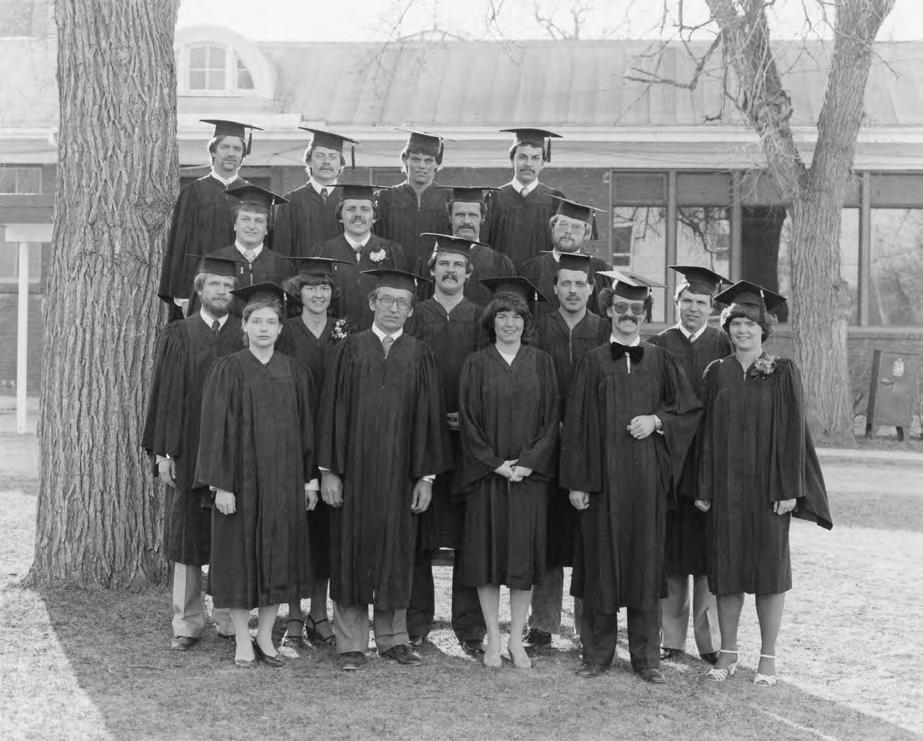
24 MBHERALD.COM JULY 2023
WINNIPEG, MANITOBA, 1982
mbchurches
Liked by miabliss and others
Modern idolatry, ancient lies
#instagram #socialmedia #unknowngod #lost mbchurches SUBSCRIBE TO MB HERALD DIGEST WWW.MBHERALD.COM/SUBSCRIBE-VIA-EMAIL



























